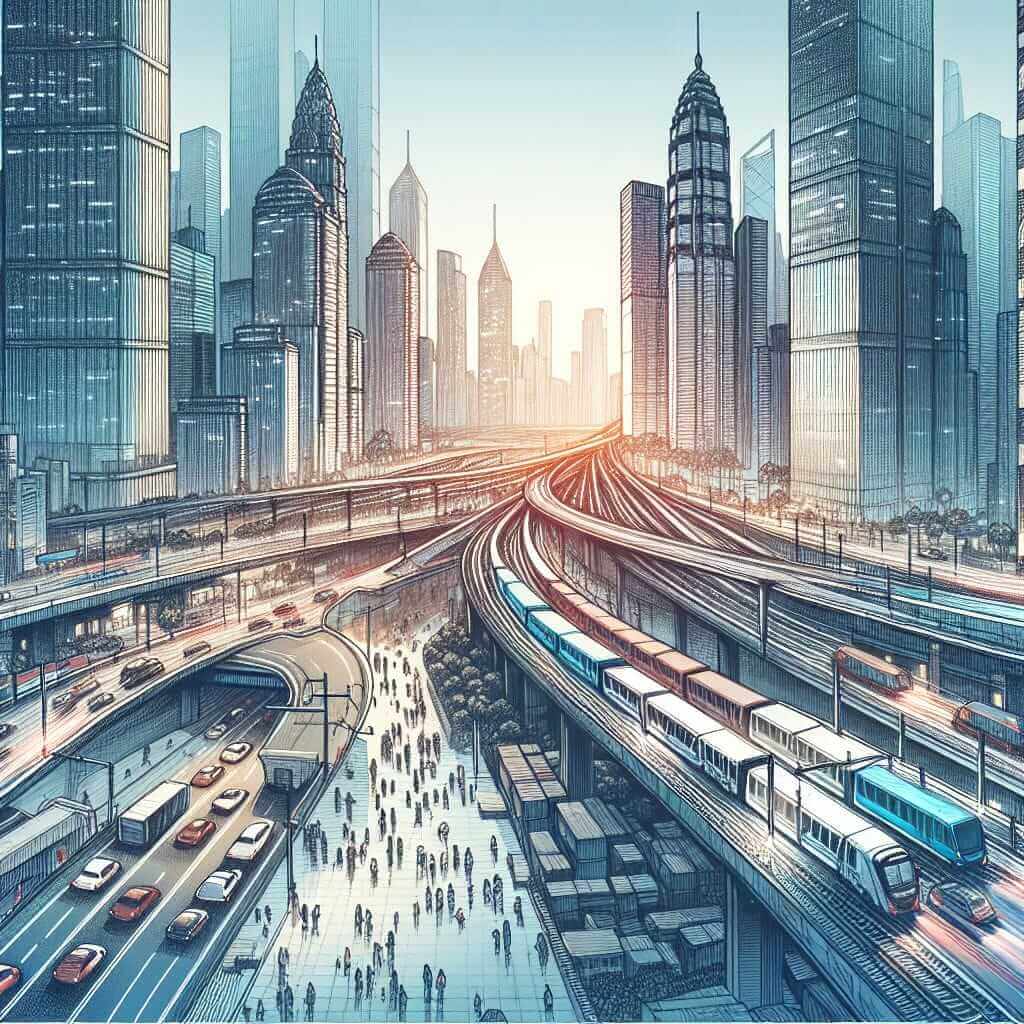The relationship between transportation infrastructure and economic growth is a recurring theme in IELTS Writing Task 2 essays. This topic requires a strong understanding of how roads, railways, airports, and seaports influence economic activities.
Here are some potential essay prompts related to this topic:
- “Some people argue that investing in transportation infrastructure is the most effective way to accelerate economic growth. To what extent do you agree or disagree?”
- “Discuss the positive and negative impacts of developing transportation infrastructure on the economy of a country.”
- “Many developing countries are investing heavily in high-speed rail networks. Do the benefits of this investment outweigh the drawbacks?”
Sample Essay: Analyzing the Impact of Transport Infrastructure Investments
Let’s delve deeper into the first prompt and craft a model essay:
“Some people argue that investing in transportation infrastructure is the most effective way to accelerate economic growth. To what extent do you agree or disagree?”
Analysis of the Question
This essay prompt asks for your opinion on the effectiveness of transportation infrastructure investments in boosting economic growth. You are expected to present your viewpoint clearly and support it with relevant examples and logical reasoning. It is crucial to acknowledge both sides of the argument while presenting a well-justified stance.
Model Essay
Investing in a robust transportation infrastructure is often cited as a fundamental driver of economic prosperity. While other factors undeniably contribute, I firmly believe that efficient transportation networks are indeed paramount in accelerating economic growth.
Firstly, improved transportation systems facilitate the seamless movement of goods and services. By reducing transport costs and transit times, businesses can reach wider markets, boosting trade and commerce. For instance, the construction of the Trans-Siberian Railway in Russia opened up vast areas of Siberia for resource extraction and trade, significantly contributing to the nation’s economic expansion.
Secondly, efficient transportation infrastructure attracts foreign direct investment. When countries possess well-maintained roads, railways, and ports, multinational corporations are more likely to invest in manufacturing and logistics operations. This influx of capital leads to job creation, technology transfer, and overall economic development. The growth of China’s manufacturing sector, fueled by substantial investments in ports and highways, exemplifies this point.

However, it is essential to acknowledge that simply building infrastructure does not guarantee economic growth. Factors like political stability, a skilled workforce, and favorable investment policies are equally crucial. Furthermore, infrastructure projects should be carefully planned and executed to avoid environmental damage and social displacement.
In conclusion, while other factors play a role, I firmly believe that investing in transportation infrastructure is arguably the most effective way to stimulate economic growth. By facilitating trade, attracting investment, and fostering regional development, efficient transportation networks pave the way for sustained economic prosperity. However, governments and policymakers must ensure these investments are part of a holistic strategy that addresses broader economic and social considerations.
Word Count: 275
Writing Tips
- Structure: Follow a clear structure with an introduction, body paragraphs, and a conclusion.
- Examples: Use relevant and specific examples to support your arguments.
- Vocabulary: Demonstrate a wide range of vocabulary related to infrastructure, economics, and development.
- Grammar: Pay close attention to grammar, ensuring accuracy in sentence structure and verb tenses.
- Cohesion & Coherence: Use linking words and phrases to ensure your essay flows smoothly and logically.
Useful Vocabulary
- Infrastructure (n.) /ˈɪnfrəstrʌktʃər/: The basic physical and organizational structures and facilities (e.g., buildings, roads, power supplies) needed for the operation of a society or enterprise.
- Economic Growth (n.) /ˌiːkəˈnɒmɪk ɡrəʊθ/: An increase in the amount of goods and services produced per head of the population over a period of time.
- Facilitate (v.) /fəˈsɪlɪteɪt/: To make an action or process easy or easier.
- Foreign Direct Investment (n.) /ˌfɒrɪn dəˈrɛkt ɪnˈvɛstmənt/: An investment made by a company or individual living in one country and investing in a company or asset in another country.
- Logistics (n.) /ləˈdʒɪstɪks/: The detailed organization and implementation of a complex operation.
- Stimulate (v.) /ˈstɪmjʊleɪt/: To encourage something to grow, develop, or become active.
- Sustained (adj.) /səˈsteɪnd/: Continuing for an extended period or without interruption.
- Holistic (adj.) /həʊˈlɪstɪk/: Characterized by the treatment of the whole person, taking into account mental and social factors, rather than just the physical symptoms of a disease.
- Paramount (adj.) /ˈpærəmaʊnt/: More important than anything else; supreme.
- Exemplify (v.) /ɪɡˈzɛmplɪfaɪ/: To be a typical example of something.
Conclusion
Mastering the art of writing a compelling IELTS essay on the impact of transportation infrastructure on economic growth requires practice, a strong vocabulary, and a clear understanding of the topic. By following the tips and utilizing the vocabulary provided, you can enhance your writing skills and approach this essay topic with confidence. Remember to analyze the question carefully, plan your essay, and support your arguments with relevant examples.